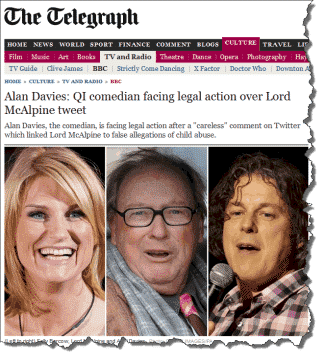 Twitter users love to think that the online chat service is a social medium. It isn’t. If it were, Lord McAlpine’s lawyer’s would not be threatening to sue the comedian Alan Davies for re-tweeting a short message which led to a link on which Lord McAlpine’s name was included.
Twitter users love to think that the online chat service is a social medium. It isn’t. If it were, Lord McAlpine’s lawyer’s would not be threatening to sue the comedian Alan Davies for re-tweeting a short message which led to a link on which Lord McAlpine’s name was included.
In case you have missed the brouhaha, Lord McAlpine was the victim in a case of mistaken identity over an alleged incident of sexual abuse. In a BBC Newsnight story a former resident of a North Wales children’s home alleged he was abused by a “leading member” of the Thacther government. The BBC did not name the individual, but before long Twitter and the rest of the social web was awash with rumours as to who it might be. After a week, The Guardian named Lord McAlpine as the victim of mistaken identity. Soon after The Guardian ran its article, Lord McAlpine issued a statement pointing out his innocence and did a lengthy interview with BBC Radio Four.
The legal action was already underway when Lord McAlpine conducted the interview and resulted in the BBC agreeing to pay Lord McAlpine £185,000 in damages plus all his legal costs. But the lawyers acting for Lord McAlpine also want to sue the people who spread the rumours on Twitter, further damaging his reputation.
If you were down the pub with your mates and you heard a story on the TV news which did not reveal the identity of an individual you and your friends may well speculate. That happened too, no doubt, with the BBC Newsnight story. But the conversations were private, between a bunch of friends. Unless those conversations were recorded the lawyers would have a tough time taking action even though slander may well have technically occurred.
And those mates down the pub may well be aware that their private speculation was inappropriate to put in writing or to spread further than their close bunch of friends. Most people realise that rumour and fact are different things.
Therein lies the problem with Twitter, though. It makes us think we are just down the pub with our mates. The visual cues of pictures of all your friends suggests you are just talking to them alone. The fact that the Tweets are short and snappy make us feel also we are in conversation mode. These two factors falsely suggest to our brains that we are in chat mode with mates, rather than in broadcast mode.
The mistake that Alan Davies could have made is the kind of thing many people may well have done. We re-tweet things just as easily as we say “Oh yeah, good point” when we are down the pub.
The problem is, down the pub we are unlikely to get into any kind of legal hot water, even if we have broken the law. But the extreme public nature of Twitter means our law-breaking is obvious.
If you want to avoid being sued, you have to stop thinking that Twitter is a social medium. It is not – it is a broadcast medium. And that means you have to think like a broadcaster and take into account the laws of libel at the very least.






1 thought on “If you think Twitter is social, think again”
Thanks for your quite insightful article. One should always be careful about what gets tweeted.
Cheers.
Comments are closed.